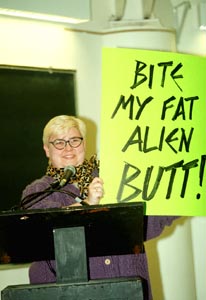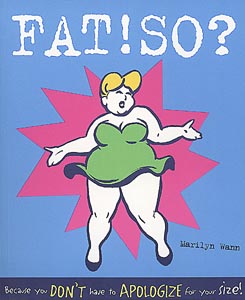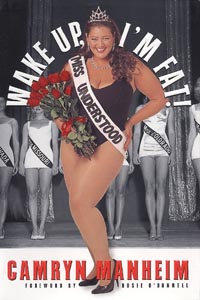![[MetroActive Features]](/features/gifs/feat468.gif)
[ Features Index | Metro Santa Cruz | MetroActive Central | Archives ]
Phat Girls
George Sakkestad
Fat girls like actress Camryn Manheim and 'Fat!So?' author Marilyn Wann are taking back the body power
By Kelly Luker
ONE BY ONE, and in groups of twos and threes, people file into Kresge Town Hall. A glance over the crowd of about 60 to 100 reveals some striking similarities. One black woman, one Eurasian woman and four men provide the contrast to an otherwise homogeneous cluster of white females. Most are young, as befits a function held at UC-Santa Cruz. And most are of slender or average weight, which is somewhat unexpected, since tonight's forum is titled "Four Women Who Don't Apologize for Their Size."
It is mid-February, and the campus--guided by the Women's Center--is hosting its first BodyFest Week. Only days after St. Valentine's orgy of love and overindulged sweets, it is the week to celebrate sweetly indulgent thighs and big, soft pillows of belly. Rebelling against a culture that promotes a pubescent boy's stick-thin silhouette as the ideal shape of a woman, the zaftig, the voluptuous and the downright fat are sending a shudder down society's bony little spine.
Although three of tonight's four speakers are forgettable, the opening guest, Marilyn Wann, brings new meaning to "fat and sassy." Don't call her obese, don't call her chubby, don't call her overweight. Wann is one of the leaders in a burgeoning movement that is taking back one of society's cruelest invectives.
"I'm fat," Wann tells her audience. "And I'm flabulous!"
Indeed she is. Funny and fast, the pretty blonde keeps the women chuckling with her exploits of waking up a fat-phobic America. But first, Marilyn Wann had to get her own wake-up call.
The process began five years ago, Wann says, when she received a letter explaining that her health insurance was being canceled because she was considered obese. Then it was the schmuck of a boyfriend who said he loved her but didn't want to be seen in public with her. The typical reaction to such a chain of events would be to plunge into a near-lethal diet of Fen/Phen, purging and double scoops of self-loathing, but Wann decided to do something incredibly sane. She fought back. She dumped the schmuck, challenged the insurance cartel and did the unthinkable--stood up and demanded to be treated like a human, and demanded the same for others like her. Out of that experience grew Fat!So?--a zine, website, book and radical notion that fat people are ... people.
IN A SOCIETY that is finally acknowledging the inherent sin in racism, sexism and homophobia, fat folks are the last safe target for hatred. While "No Fat Chicks" maintains enduring popularity as a Southern California bumper sticker, try to imagine how long a car with "No Niggers" or "No Kikes" plastered on it will survive. Or its occupants, for that matter.
But fat jokes are a staple of the Letterman/Leno/late-night circuit. Whether it's the Duchess of Pork, the Portly Pepperpot Lewinsky, Roseanne or whoever else has dared to live larger than a size 10, the boys are there, ready to bring them back down to where they belong. Invisible.
No more, say folks like Wann and actress Camryn Manheim. Manheim, who will be in town this Saturday at Bookshop Santa Cruz to promote her new book, Wake Up, I'm Fat!, has grabbed far more of the spotlight, recently gracing the cover of TV Guide and USA Weekend. Best known for her role as Ellenor on the TV show The Practice, Manheim celebrates--rather than berates--her plus-size body.
Manheim recounts in her book the long-waged war with food and weight. She emerged the winner, giving voice to the reality that fat women can be sexy, talented, popular and, shockingly, not filled with self-hatred.
Both fat activists make many of the same observations. "Fat has risen from a level of appearance to 'there's something wrong with you,' " says Wann in a phone interview. She attributes this phenomenon to the newest twist in a centuries-old Puritanical loathing of desire.
"Instead of being repressed around sex," she figures, "now we're repressed around food."
No longer a mere benchmark of attractiveness--or lack of it--fat telegraphs a Rorschach of failings about its owner: lazy, weak-willed, out-of-control. But this being the '90s, the rotund are now also a beacon of "disorders" and "issues." If overeating is not a moral weakness, then it is a psychological hotbed of everything from low self-esteem to repressed memories of childhood sexual abuse.
Sins of the flesh, textbook disorders or planetary inharmony--take your pick and there's someone ready to make a buck out of making you into the next Calista Flockhart. A lot of bucks, actually. The weight-loss industry brings in anywhere between 30 and 40 billion dollars a year. And one couldn't pick an industry with more job security than this one: 95 to 98 percent of everyone who loses weight gains it back in three years. And more.
The National Institutes of Health gave dieting the heave-ho back in 1992, declaring that diets are ineffective and, in fact, dangerous to your health. Given all that, why do we continue to flock like lemmings to The Zone, The Scarsdale Diet, the Beverly Hills Diet, the binge-purge-laxatives-vomit diet? Ask the children.
Queried on whether they would rather be overweight or missing an arm, four out of five elementary school-age kids chose dismemberment. It starts young, this mortification of the flesh and near-religious quest for jutting hip bones. By age 9, according to the National Association of Anorexia Nervosa and Associated Disorders, 50 percent of all girls have already been on their first diet. It doesn't help to grow up in a culture that deifies gaunt yet schizophrenically continues to get fatter every decade.
That last statistic seems to throw a curve ball into fat activists' claim that weight--like race or sexual orientation--is predetermined. Wann figures that there are many reasons why folks are getting fatter, and they have nothing to do with genetics. But it may have to do with people fighting their genetic heritage.
"We are getting fatter, but we're dieting more," Wann says. "Instead of having a normal relationship with food, everyone has some disordered eating pattern."
While Wann never even bothered with the diet route, Camryn Manheim almost killed herself with speed to get the waifish figure that would never be hers. Although self-acceptance was a while in coming, success followed anyway. After attending Cabrillo College, graduating from UCSC with a degree in theater arts and earning an M.F.A. from New York University, Manheim worked in theater, television and film. And along the way, she got comfy with her destiny as a big gal.
Inspired by other fat activists, Manheim developed an off-Broadway show in 1995 with the same title as her recently released book. Wake Up, I'm Fat! eventually earned the attention of producer David E. Kelley, who wrote her character Ellenor into The Practice. Still, Manheim has had to fight to get the writers to include romantic scenes for the character that is unapologetically big, sexy and tough.
A gifted actress, Manheim won a 1998 Emmy award, which she accepted for her role as Ellenor with the now-famous line "This is for all the fat girls!"
BUT IT'S NOT JUST the fat girls who need liberating. Returning to that night at Kresge Town Hall, I ask Marilyn Wann about the roomful of willowy young women. "In the five years I've been doing Fat?So! I realize that thin women suffer more than I ever did," Wann says.
It is mass psychosis that has infected a generation of young women, convincing them that they will not be happy until they resemble supermodels on speed. Volumes have been written about this latest tactic in women's oppression--keep 'em busy worrying about their cellulite--but the collaboration of otherwise healthy women is heartbreakingly familiar, all the same.
I grew up with a mother who pointed out every overweight person we passed on the street. They were not young or old, talented, black, friends or relatives, but a size first. Perhaps only coincidentally, two of her three children struggled with lifelong eating disorders. Weight Watchers, Overeaters Anonymous, diet pills and vomiting were as much a part of the coming-of-age landscape for these two as prom night was for the generation before. While their weight never posed a health risk, what they both did to fight this chimera cost them their physical and emotional health, their self-esteem and that most precious of commodities--time.
My family genes run toward a corn-fed, country-bred body type, but none of my siblings ever came close to fitting the definition of fat. Or obese. Or particularly overweight, for that matter--until the dieting started.
For each fat girl who suffers, you can bet dozens more slender young things are watching their lives disappear beneath the weight of an obsession about a body that will never be theirs. It's a self-imposed nightmare, to be sure, but it gets a lot of help from everyone from the diet freak in the cubicle down the hall to Oprah making the connection.
It's not a perfect world, and it never will be. But just as the queer movement stole back that word from the dark shadows of prejudice, so too are Manheim and Wann finding pride and freedom in that once-unspeakable epithet. As long as they keep talking and kicking down the doors, they won't be the only ones.
Copyright © Metro Publishing Inc. Maintained by Boulevards New Media.
![]()
 Living Extra Large: Marilyn Wann, of the zine, website and book 'Fat?So!' is part of the movement against the body police.
Living Extra Large: Marilyn Wann, of the zine, website and book 'Fat?So!' is part of the movement against the body police.

from 'Fat!So?'

from 'Wake Up, I'm Fat!'
Camryn Manheim will read on Saturday at 7:30pm at Bookshop Santa Cruz. For info, call 423-0900. Marilyn Wann's website is at www.fatso.com.
From the May 19-26, 1999 issue of Metro Santa Cruz.